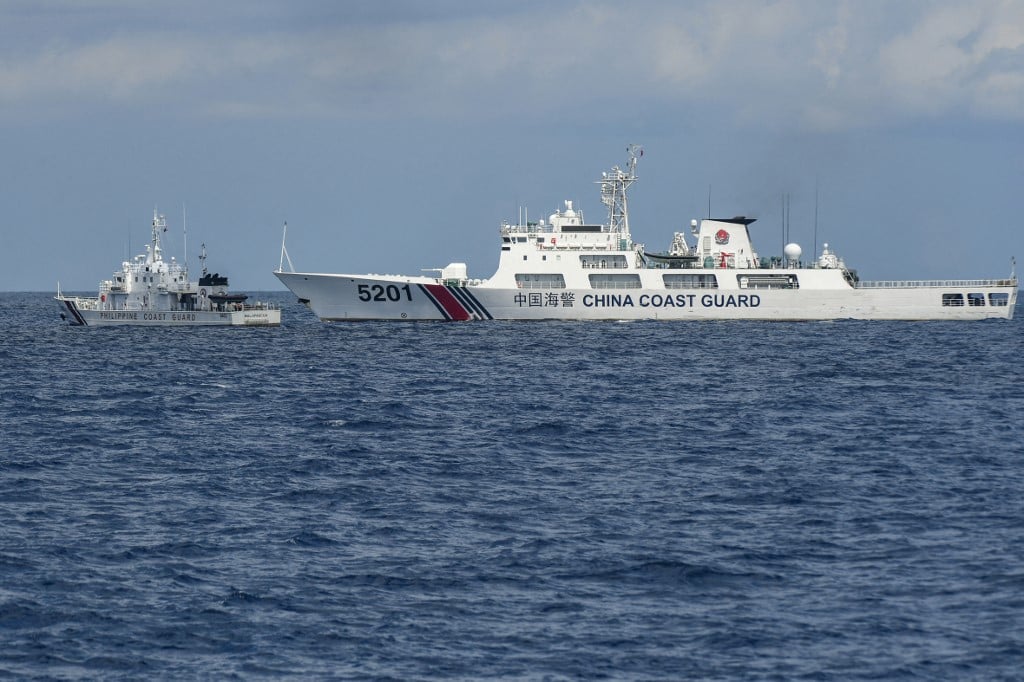China says Philippine boat’s ‘provocative action’ caused near-crash
This photo taken on April 23, 2023 shows the Philippine coast guard vessel BRP Malapascua (L) manoeuvering as a Chinese coast guard ship cuts its path at Second Thomas Shoal in the Spratly Islands in the disputed South China Sea. AFP was one of several media outlets invited to join two Philippine Coast Guard boats on a 1,670-kilometer (1,040-mile) patrol of the South China Sea, visiting a dozen islands and reefs. Beijing claims sovereignty over almost the entire South China Sea, including the Spratly Islands, ignoring an international ruling that the assertion has no legal basis. (Photo by Ted ALJIBE / AFP)
Beijing, China — China said Friday that a near-collision in the South China Sea between a Chinese coast guard ship and a Philippine patrol vessel carrying journalists was caused by the latter’s “premeditated and provocative action”.
The near-miss off the Spratly Islands on Sunday was the latest in a steady string of stand-offs between China and the Philippines in the contested waterway.
Beijing claims sovereignty over almost the entire South China Sea, including the Spratlys, ignoring an international ruling that the assertion has no legal basis.
In Sunday’s incident, two Philippine coast guard boats approached Second Thomas Shoal, known in China as Ren’ai Jiao.
As one boat, the BRP Malapascua, neared the shoal, a Chinese Coast Guard vessel more than twice its size sailed into its path.
AFP journalists watched the incident from another Philippine coast guard boat, which was less than a kilometer (0.6 miles) away.
The Malapascua’s commanding officer said the Chinese ship came within 45 meters (50 yards) of his boat and only his quick actions avoided the steel-hulled vessels crashing into each other.
Asked about the incident on Friday at a regular press briefing, the Chinese foreign ministry said the Philippine boats had “intruded” without China’s permission.
“The Chinese coast guard vessel safeguarded China’s territorial sovereignty and maritime order, in accordance with the law, while taking timely measures to avoid the dangerous approach of Philippine vessels and to avoid a collision,” said spokeswoman Mao Ning.
“It was a premeditated and provocative action for the Philippine vessel to barge into the waters of Ren’ai Jiao with journalists on board, the aim was to deliberately find fault and take the opportunity to hype up the incident,” she added.
Mao said the crew of the Chinese vessel had acted “professionally and with restraint”.
But on Friday Mao’s Philippine counterpart Teresita Daza accused them of putting the Malapascua’s crew in “serious danger”.
“The China Coast Guard’s interference with this routine patrol mission was totally inconsistent with freedom of navigation, and a number of documented incidents also involved highly dangerous maneuvers that were contrary to standard navigational practices,” Daza said.
Close call
Second Thomas Shoal is about 200 kilometers from the Philippine island of Palawan and more than 1,000 kilometers from China’s nearest major landmass of Hainan island.
Over the past decade, China has ripped up thousands of hectares of reef in the South China Sea to create militarized islands with runways, ports, and radar systems.
AFP was one of several media outlets invited to join the Philippine Coast Guard boats on a patrol of the sea, visiting a dozen islands and reefs.
The Malapascua and BRP Malabrigo were shadowed by Chinese Navy and coast guard ships, and ordered to leave the waters several times during the six-day journey.
The commanding officer of the Malapascua, Rodel Hernandez, told AFP Chinese boats routinely blocked his and other Philippine coast guard ships during their patrols near the shoal.
But Sunday was the “closest” he had seen vessels from the rival fleets come to a collision, he said.
The near-miss came just a day after Philippine President Ferdinand “Bongbong” Marcos Jr. hosted Chinese Foreign Minister Qin Gang for talks in Manila aimed at defusing tensions in the contested waterway.
Since taking office last June, Marcos has insisted he will not let China trample on the Philippines’ rights in the sea — in contrast to his predecessor Rodrigo Duterte who was reluctant to criticize Beijing.
Marcos has meanwhile gravitated towards the Philippines’ traditional ally, the United States, as he seeks to strengthen their defense ties.
This shift has alarmed China, which has accused Washington of trying to drive a wedge between Beijing and Manila.
READ:
Chinese, Philippine vessels in ‘David and Goliath’ near-crash
Coast guard Central Visayas lifts suspension of sea trips
Disclaimer: The comments uploaded on this site do not necessarily represent or reflect the views of management and owner of Cebudailynews. We reserve the right to exclude comments that we deem to be inconsistent with our editorial standards.

